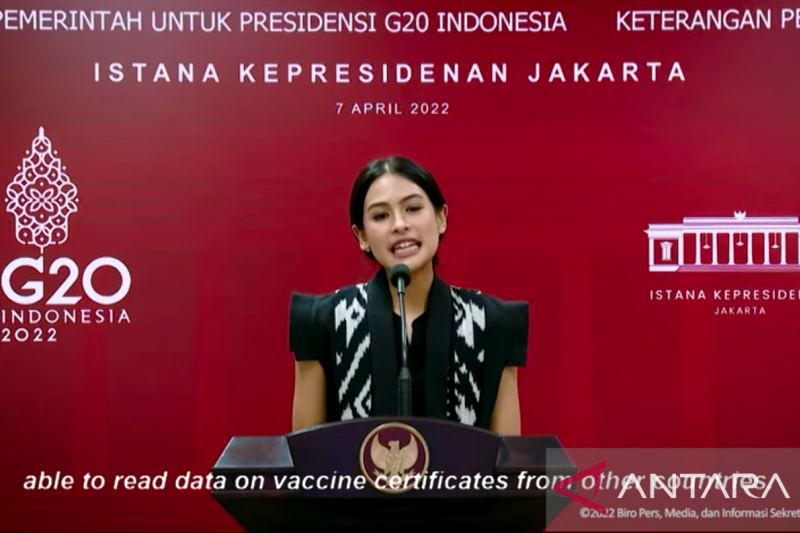
Government Spokesperson for the G20 Indonesian Presidency Maudy Ayunda in an online press conference in Jakarta on Thursday, April 7, 2022. (ANTARA PHOTOS/Indra Arief/my)
Government spokesperson for the G20 Indonesian Presidency Maudy Ayunda stated that all G20 members would use the Quick Response Code (QR Code) to ensure implementation of health protocols in each country.
"This policy will be imposed on all G20 member countries and will be applied in stages in other countries," Ayunda noted at an online press conference here on Thursday.
She stated that the consensus to use the QR Code was one of the results at the Health Working Group meeting of the G20 in Yogyakarta at the end of March.
The QR Code policy was a means to digitize documents of implementation of health protocols, which would -- upon its application -- synchronize global health protocols used in various countries.
The Health Ministry also initiated the use of a universal vaccine certificate verification system that complies with the World Health Organization (WHO) standards, she stated. The universal verifier is a special portal capable of reading vaccine certificate data from other countries.
"With this system, digital certificates of travelers’ vaccines can be (recognized) in other countries. This portal has been tested in 19 G20 countries and received positive responses," he remarked.
The government also encouraged the use of the universal verifier in other countries, thereby assisting their efforts to handle the pandemic situation.
Related news: G20 HWG delegates agree to harmonize global health protocols
The synchronization of global health protocol standards would also provide certainty to travelers, she opined. Protocol standards that differ from one country to the other would cause problems, thereby hindering international travel.
Creating uniform global health protocol standards had also become one of the issues derived from the main issues of the global health architecture in Indonesia's G20 Presidency.
"Why is unifying global health protocols so important? COVID-19 is still a global threat, including to Indonesia. Discipline in (following) health protocols is an absolute must, especially for traveling between countries. It will be a problem if the standard of health protocols varies between countries," she concluded.
Related news: Global health protocol synchronization can begin with G20: minister
"This policy will be imposed on all G20 member countries and will be applied in stages in other countries," Ayunda noted at an online press conference here on Thursday.
She stated that the consensus to use the QR Code was one of the results at the Health Working Group meeting of the G20 in Yogyakarta at the end of March.
The QR Code policy was a means to digitize documents of implementation of health protocols, which would -- upon its application -- synchronize global health protocols used in various countries.
The Health Ministry also initiated the use of a universal vaccine certificate verification system that complies with the World Health Organization (WHO) standards, she stated. The universal verifier is a special portal capable of reading vaccine certificate data from other countries.
"With this system, digital certificates of travelers’ vaccines can be (recognized) in other countries. This portal has been tested in 19 G20 countries and received positive responses," he remarked.
The government also encouraged the use of the universal verifier in other countries, thereby assisting their efforts to handle the pandemic situation.
Related news: G20 HWG delegates agree to harmonize global health protocols
The synchronization of global health protocol standards would also provide certainty to travelers, she opined. Protocol standards that differ from one country to the other would cause problems, thereby hindering international travel.
Creating uniform global health protocol standards had also become one of the issues derived from the main issues of the global health architecture in Indonesia's G20 Presidency.
"Why is unifying global health protocols so important? COVID-19 is still a global threat, including to Indonesia. Discipline in (following) health protocols is an absolute must, especially for traveling between countries. It will be a problem if the standard of health protocols varies between countries," she concluded.
Related news: Global health protocol synchronization can begin with G20: minister


















